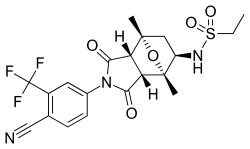BMS-641988
BMS-641988 is a nonsteroidal antiandrogen which was developed by Bristol-Myers Squibb for the treatment of prostate cancer but was never marketed.[1][2][3] It acts as a potent competitive antagonist of the androgen receptor (AR) (Ki = 10 nM; IC50 = 56 nM).[3] The drug was found to have 20-fold higher affinity for the AR than bicalutamide in MDA-MB-453 cells, and showed 3- to 7-fold the antiandrogenic activity of bicalutamide in vitro.[4] It may have some weak partial agonist activity at the androgen receptor.[4] BMS-641988 is transformed by CYP3A4 into BMS-570511, and this metabolite is then reduced to BMS-501949 by cytosolic reductases.[5][4] All three compounds show similar antiandrogenic activity.[5] In addition to its antiandrogenic activity, BMS-641988 shows activity as a negative allosteric modulator of the GABAA receptor, and can produce seizures in animals at sufficiently high doses.[6] It also shows some drug-induced QT prolongation.[6] BMS-641988 reached phase I clinical trials prior to the discontinuation of its development.[1] The clinical development of BMS-641988 was terminated due to the occurrence of a seizure in a patient during a phase I study.[5]
 | |
| Clinical data | |
|---|---|
| Routes of administration | By mouth |
| Drug class | Nonsteroidal antiandrogen |
| Identifiers | |
IUPAC name
| |
| CAS Number |
|
| PubChem CID | |
| UNII | |
| ChEBI | |
| ChEMBL | |
| Chemical and physical data | |
| Formula | C20H20F3N3O5S |
| Molar mass | 471.451 g/mol g·mol−1 |
| 3D model (JSmol) | |
SMILES
| |
InChI
| |
References
- https://adisinsight.springer.com/drugs/800026026
- Attar RM, Jure-Kunkel M, Balog A, Cvijic ME, Dell-John J, Rizzo CA, Schweizer L, Spires TE, Platero JS, Obermeier M, Shan W, Salvati ME, Foster WR, Dinchuk J, Chen SJ, Vite G, Kramer R, Gottardis MM (August 2009). "Discovery of BMS-641988, a novel and potent inhibitor of androgen receptor signaling for the treatment of prostate cancer". Cancer Res. 69 (16): 6522–30. doi:10.1158/0008-5472.CAN-09-1111. PMID 19654297.
- Cabeza M, Sánchez-Márquez A, Garrido M, Silva A, Bratoeff E (2016). "Recent Advances in Drug Design and Drug Discovery for Androgen- Dependent Diseases". Curr. Med. Chem. 23 (8): 792–815. doi:10.2174/0929867323666160210125642. PMC 5412001. PMID 26861003.
- Vasaitis TS, Njar VC (April 2010). "Novel, potent anti-androgens of therapeutic potential: recent advances and promising developments". Future Med Chem. 2 (4): 667–80. doi:10.4155/fmc.10.14. PMID 21426013.
- Rathkopf D, Liu G, Carducci MA, Eisenberger MA, Anand A, Morris MJ, Slovin SF, Sasaki Y, Takahashi S, Ozono S, Fung NK, Cheng S, Gan J, Gottardis M, Obermeier MT, Reddy J, Zhang S, Vakkalagadda BJ, Alland L, Wilding G, Scher HI (February 2011). "Phase I dose-escalation study of the novel antiandrogen BMS-641988 in patients with castration-resistant prostate cancer". Clin. Cancer Res. 17 (4): 880–7. doi:10.1158/1078-0432.CCR-10-2955. PMC 3070382. PMID 21131556.
- Joel Barrish; Percy Carter; Peter Cheng; Robert Zahler (30 September 2010). Accounts in Drug Discovery: Case Studies in Medicinal Chemistry. Royal Society of Chemistry. pp. 120–. ISBN 978-1-84973-198-0.